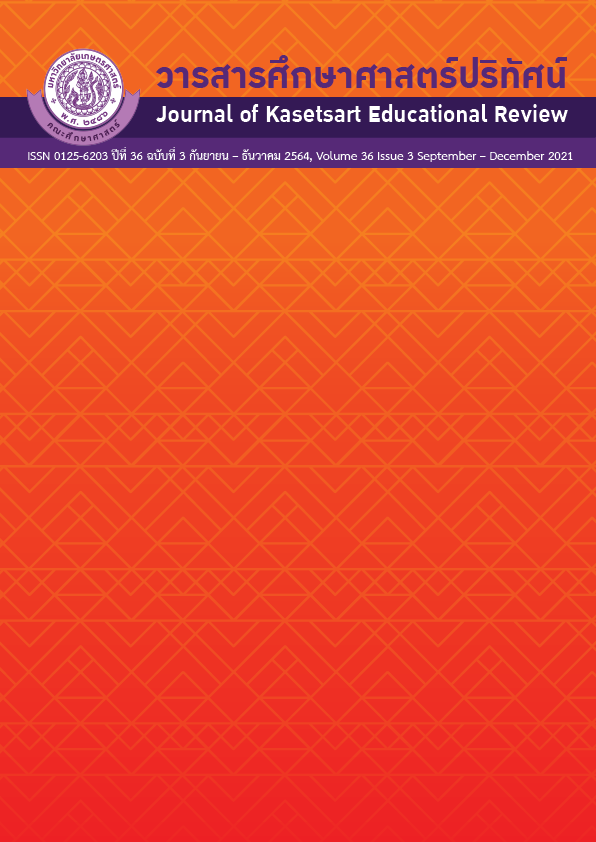การศึกษาวิจัยหลักสูตรการเรียนการสอนระดับอุดมศึกษาที่ตอบโจทย์ชุดความรู้ และทักษะที่จำเป็นสำหรับอุตสาหกรรมอาหารแห่งอนาคต
คำสำคัญ:
หลักสูตร, อุดมศึกษา, ชุดความรู้และทักษะ, การผลิตกำลังคน, อุตสาหกรรมอาหารแห่งอนาคต, อุตสาหกรรมเดิมที่มีศักยภาพบทคัดย่อ
ประเทศไทยยังคงประสบปัญหาความไม่สอดคล้องระหว่างการจัดการศึกษาและความต้องการของตลาดแรงงานทั้งในแนวดิ่งและแนวระนาบ เนื่องจากระบบอุดมศึกษา ไม่สามารถบริหารจัดการอุปทานแรงงานได้อย่างมีประสิทธิผล จนท้ายที่สุดนำไปสู่ความสูญเปล่าของการลงทุนเพื่อการศึกษาของประเทศชาติ งานวิจัยนี้จึงมีวัตถุประสงค์เพื่อ 1) วิเคราะห์ข้อมูลหลักสูตรการเรียนการสอนในระดับอุดมศึกษาและเกณฑ์มาตรฐานวิชาชีพที่สอดคล้องกับตำแหน่งงานในอุตสาหกรรมอาหารแห่งอนาคต 2) วิเคราะห์ความเชื่อมโยงระหว่างความรู้และทักษะของผู้เรียนที่กำหนดไว้ในหลักสูตรและเกณฑ์มาตรฐานวิชาชีพกับความรู้และทักษะที่จำเป็นต่ออุตสาหกรรมอาหารแห่งอนาคต และ 3) จัดทำข้อเสนอแนะแนวทางการปรับเปลี่ยนหลักสูตรการเรียนการสอนและมาตรการ กลไก หรือระบบการผลิตผู้สำเร็จการศึกษาให้มีชุดความรู้และทักษะที่จำเป็นเพื่อให้สามารถปรับตัวกับการเปลี่ยนแปลงเทคโนโลยีและรูปแบบธุรกิจอย่างฉับพลันได้
วิธีดำเนินการวิจัย ได้แก่ การวิเคราะห์เอกสารหลักสูตร 115 หลักสูตร การสัมภาษณ์กึ่งโครงสร้างผู้เชี่ยวชาญ 3 ท่าน และการสนทนากลุ่มซึ่งสอดแทรกกระบวนการสมมตินัยและการจัดลำดับความสำคัญด้วยการ์ดกับผู้มีส่วนได้ส่วนเสีย 12 ท่าน จากนั้นวิเคราะห์เอกสารหลักสูตรด้วยการวิเคราะห์เนื้อหาและสถิติเชิงพรรณนา และวิเคราะห์ข้อมูลจากผู้ให้ข้อมูลสำคัญด้วยการวิเคราะห์แก่นสาระ
ผลการวิจัยพบว่า หลักสูตรที่วิเคราะห์มีจุดแข็งหรือปัจจัยสนับสนุนหลายประการ แต่มีข้อจำกัดหลายประการเช่นกัน และเมื่อพิจารณาความสอดคล้องระหว่างวัตถุประสงค์ของหลักสูตร ชื่อรายวิชา คำอธิบายรายวิชา ผลลัพธ์การเรียนรู้ของหลักสูตร และเกณฑ์มาตรฐานวิชาชีพกับชุดความรู้และทักษะที่จำเป็นสำหรับอุตสาหกรรมอาหารแห่งอนาคตพบความสอดคล้องกับคำอธิบายรายวิชามากกว่าส่วนอื่นของหลักสูตร โดยรายการชุดความรู้และทักษะที่พบความสอดคล้องมากที่สุดในระดับปริญญาตรีคือด้านวิทยาศาสตร์การอาหาร ส่วนในระดับปริญญาโทและเอกพบมากที่สุดคือด้านเทคโนโลยีและนวัตกรรมอาหาร ในขณะที่ชุดความรู้และทักษะที่พบความสอดคล้องน้อยที่สุดในทุกระดับการศึกษาคือด้านการออกแบบอาหาร
ข้อเสนอแนะสำคัญจากการวิจัยเพื่อการพัฒนาในระดับหลักสูตร ได้แก่ การลดทอนรายวิชาที่ไม่จำเป็น การจัดหลักสูตรที่ตอบสนองความต้องการของผู้เรียนเป็นรายบุคคล การเตรียมผู้เรียนให้พร้อมกับตำแหน่งงานที่หลากหลาย การพัฒนาทักษะการคิดและจรณทักษะ การพัฒนาระบบแนะแนวที่ทำให้ผู้เรียนค้นพบตนเอง และการสร้างความร่วมมือกับสถานประกอบการ ในด้านข้อเสนอแนะในระดับ มหภาค ได้แก่ การปรับมาตรฐานคุณวุฒิ (มคอ.1) ให้ยืดหยุ่นสอดคล้องกับความต้องการของผู้เรียนและของโลกมากขึ้น และการพัฒนาคุณภาพอาจารย์ทั้งระบบให้มีคุณวุฒิและสมรรถนะสอดคล้องกับการเปลี่ยนแปลงของโลก
เอกสารอ้างอิง
D2L Corporation (2019). The Future of Skills in the Age of the 4th Industrial Revolution. Retrieved from https://www.d2l.com/wp-content/uploads/2018/01/The-Future-of-Work-and-Learning-D2L.pdf
Independent Committee for Educational Reform (2019). Thailand Educational Reform. Retrieved from https://www.thaiedreform.org/ knowledge/3019/ [In Thai]
Kim, W.C. & Maoborgne, R. (2015). Blue Ocean Strategy: How to Create Uncontested Market Space and Make the Competition Irrelevant (Expanded Edition). Boston, MA: Harvard Business School Publishing Corporation.
Kim, W.C. & Maoborgne, R. (2017). Blue Ocean Strategy Shift: Beyond Competing. New York, NY: Hachette Book Group.
Krathwohl, D. R. (2002). A Revision of Bloom’s Taxonomy: An Overview. Theory Into Practice, 41 (4), pp. 212-218. DOI: https://doi.org/10.1207/s15430421tip4104_2
National Food Institute (2021). Future Food. Retrieved from http://fic.nfi.or.th/futurefood/
National Science Technology and Innovation Policy Office (2018). Thailand Talent Landscape and Intervention Phase I. (Unpublished). [In Thai]
Office of Industrial Economics (2017). New Engine of Growth. Bangkok: OIE. [In Thai]
Office of National Higher Education Science Research and Innovation Policy Council (2020). Thailand Talent Landscape and Intervention Phase II. (Unpublished). [In Thai]
Office of the Royal Society (2014). Skills. Retrieved from http://legacy.orst.go.th/
Organization for Economic Co-operation and Development (2018). Education 2030 Curriculum Content Mapping: An Analysis of the Netherlands Curriculum Proposal. Retrieved from https://www.oecd.org/ education/2030- project/contact/E2030 _CCM_analysis_NLD_curriculum_proposal.pdf
Organisation for Economic Co-operation and Development (2019a). The Future of Education and Skills 2030: OECD Learning Compass 2030: A Series of Concept Notes. Paris: OECD.
Organisation for Economic Co-operation and Development (2019b). OECD Future of Education and Skills 2030: Curriculum Analysis: Change Management: Facilitating and Hindering Factors of Curriculum Implementation. Retrieved from https://www.oecd.org/education/ 2030-project/contact/Change_management_for_curriculum_implementation_Facilitating_ and_hindering_factors_of_curriculum_implementation.pdf
Pholphirul, P. (2017). Educational Mismatches and Labor Market Outcomes: Evidence from both Vertical and Horizontal Mismatches in Thailand. Education and Training, 59 (5), pp. 534-546. DOI: https://doi.org/10.1108/ET-11-2016-0173
Senkrua, A. (2015). The Mismatch in Thai Labor Market: Overeducation. (Doctoral dissertation). Retrieved from http://libdcms.nida.ac.th/ thesis6/2015/b188417.pdf
UNESCO International Bureau of Education (2021). Competency-based Curriculum. Retrieved from http://www.ibe. unesco.org/en/glossary-curriculum-terminology/c/competency-based-curriculum.
United Nations Education, Scientific, and Cultural Organization (2017). Assessment of Transversal Competencies: Current Tools in the Asian Region. Retrieved from https://bangkok.unesco. org/ content/assessment-transversal-competencies-current-tools-asian-region
U.S. Department of Health and Human Services (2018). Gaining Consensus Among Stakeholders Through the Nominal Group Technique. Retrieved from https://www.cdc.gov/healthyyouth/evaluation/pdf/brief7.pdf
Visible-Learning (2018). Collective Teacher Efficacy (CTE) according to John Hattie. Retrieved from https://visible-learning.org/2018/03/ collective-teacher-efficacy-hattie/
Wongwanich, S. (2015). Needs Assessment Research. Bangkok: Chulalongkorn University Press. [In Thai]
World Bank (2016). Education Global Practice Smarter Education Systems for Brighter Futures: SABER Tertiary Education. Retrieved from https://documents1.worldbank.org/ curated/en/ 662311496297693882/pdf/ SABER-tertiary-education.pdf
ดาวน์โหลด
เผยแพร่แล้ว
ฉบับ
ประเภทบทความ
สัญญาอนุญาต
ลิขสิทธิ์ (c) 2021 วารสารศึกษาศาสตร์ปริทัศน์

อนุญาตภายใต้เงื่อนไข Creative Commons Attribution-NonCommercial-NoDerivatives 4.0 International License.
บทความทุกบทความเป็นลิขสิทธิ์ของวารสารคณะศึกษาศาสตร์ มหาวิทยาลัยเกษตรศาสตร์ วิทยาเขตบางเขน
วารสารศึกษาศาสตร์ปริทัศน์ (Kasetsart Educational Review)






